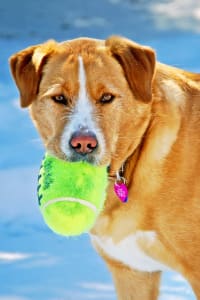Rocky’s Viewpoint

Does your dog give you “that look” or growl at you when he has his favorite toy and you try to take it away? What about when your other dog gets near his food bowl? If so, your dog is doing what is called “resource guarding.” According to animal behaviorist Patricia McConnell, PhD, CAAB, resource guarding is a behavior that discourages another to take, or get too close to an object or valued area in a dog’s possession.
Dogs resource guard all sorts of things from toys to sleeping areas, members of their household, and even things like poop! My own dog Yankee has never guarded anything until I recently gave him a bone he especially values. I can take it away from him but heaven forbid if another dog he doesn’t know very well gets close to him when he has that bone. He acts quickly and snaps at the other dog, unless the other dog backs away immediately.
Indications of resource guarding can range from a head turn, a low to a loud growl, or an actual bite. Between dogs, resource guarding is normal and when one dog signals that whatever he’s guarding is his prize, the appropriate response from the other dog is to back off. That doesn’t always happen, and that’s when trouble occurs. Another problem occurs when the initial signal from the guarding dog is too severe, like what my dog does. Like me, if you have a dog that may snap without warning at another dog who comes too close to his prize, you might have a problem you want to address.
appropriate response from the other dog is to back off. That doesn’t always happen, and that’s when trouble occurs. Another problem occurs when the initial signal from the guarding dog is too severe, like what my dog does. Like me, if you have a dog that may snap without warning at another dog who comes too close to his prize, you might have a problem you want to address.
Resource guarding problems between dogs and people is another story. For his own safety, you should be able to take anything away from your dog at any time, without his protest. If not, this is a problem you should fix.
What can you do to help a dog who inappropriately resource guards things? Ideally you start when the dog is young. Using positive reinforcement, teach your dog to tolerate the presence of a variety of people, their hands, and other dogs around his food, toys and other things he may value. If you adopt a dog that’s already learned to guard things, depending on the severity of the guarding signal, you can fix it, through desensitizing and classical conditioning. This is a process where you teach him to trade good stuff for better stuff, then give him his good stuff back. If you feel that your dog would seriously injure you if you attempt to take away his prize, contact an animal behaviorist or force free trainer who understands classical conditioning.
Once you’ve changed the behavior, regularly keep practicing taking things away and giving them something even better in return. That way you continue to reinforce to your dog that good things happen when he lets you take stuff away from him. If you need help or would like more information, please don’t hesitate to contact us.